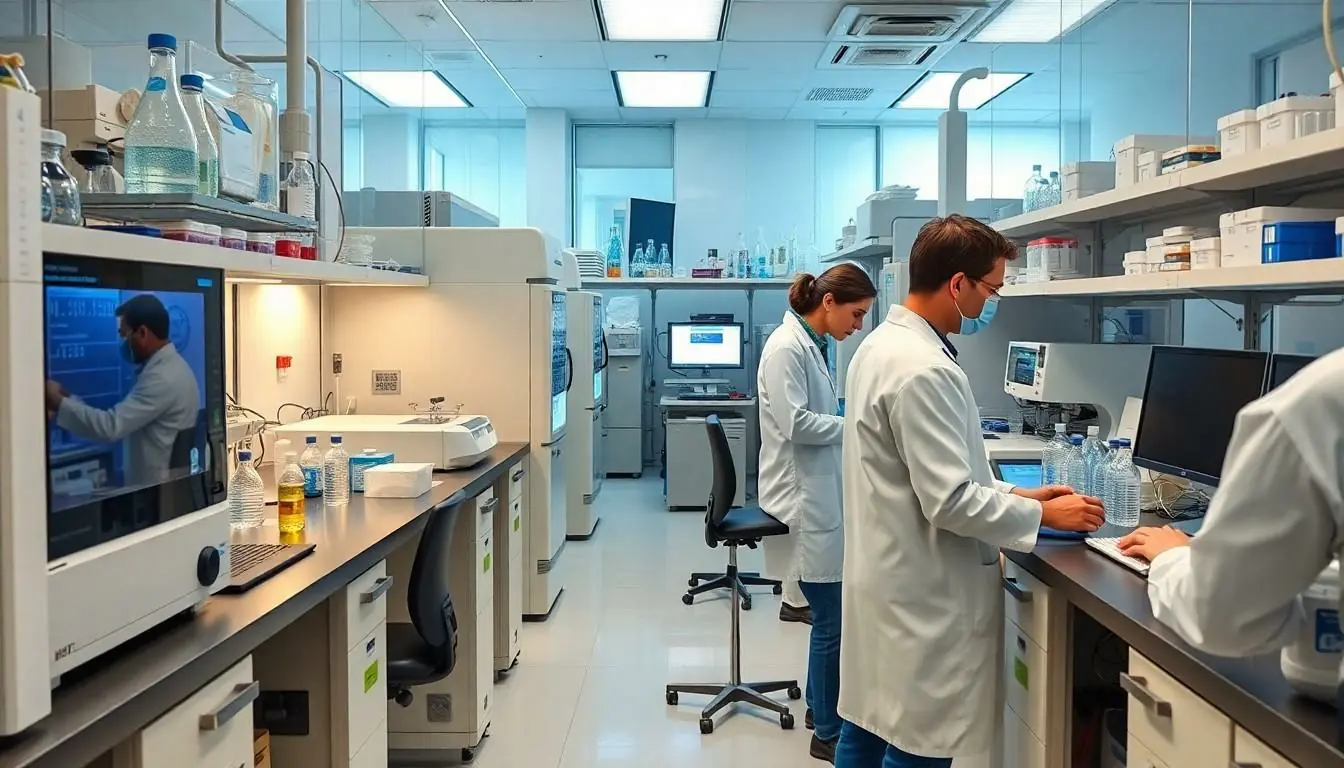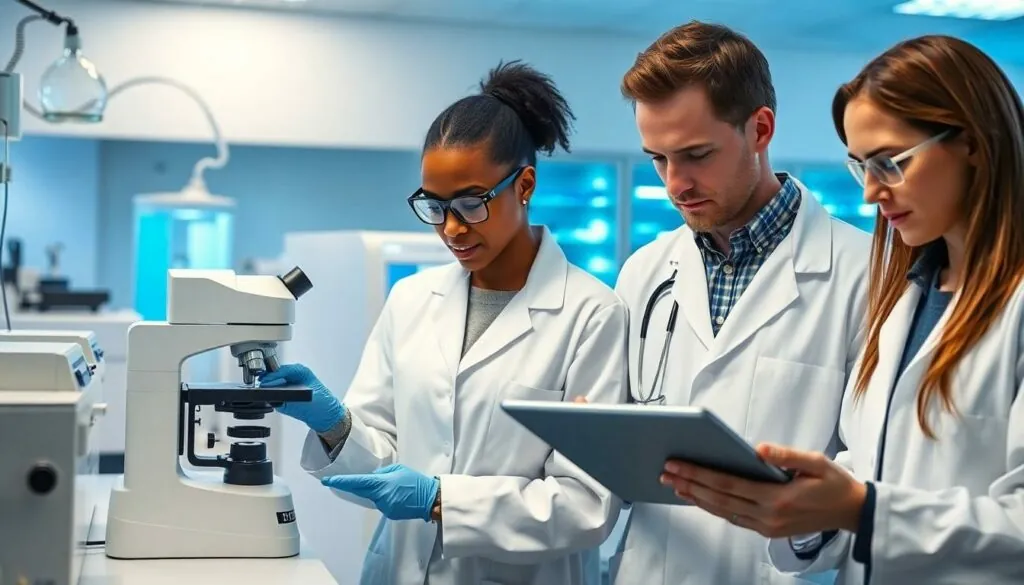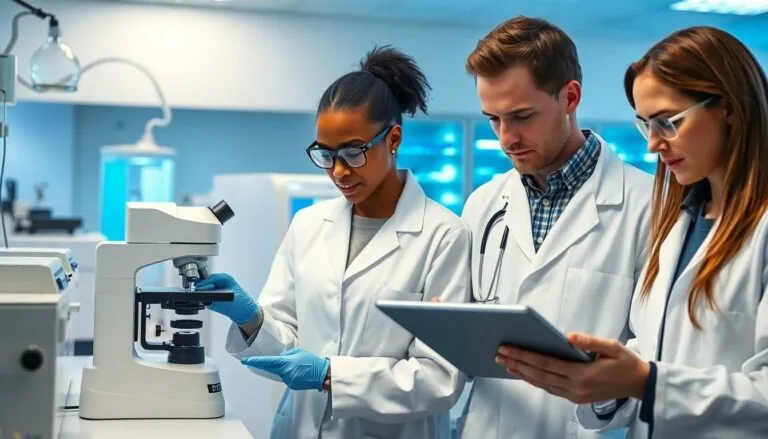Table of Contents
ToggleIn a world where science fiction often meets reality, biotech clinical laboratories are at the forefront of transforming health care. These high-tech havens are where cutting-edge research and innovation collide, turning the impossible into the possible. Imagine a place where scientists don lab coats instead of capes, wielding pipettes and test tubes like superheroes on a mission to save lives.
But it’s not just about fancy equipment and lab coats. These laboratories play a crucial role in diagnosing diseases, developing treatments, and even personalizing medicine. With every test and trial, they’re shaping the future of health care one breakthrough at a time. So buckle up as we dive into the fascinating world of biotech clinical laboratories, where every sample tells a story and every result could hold the key to a healthier tomorrow.
Overview of Biotech Clinical Laboratories
Biotech clinical laboratories play a crucial role in modern medicine. These facilities focus on research and diagnostics, examining biological samples to uncover insights about health conditions. Innovative technologies and methods drive the work performed in these labs. Genetic testing, molecular diagnostics, and cell culture techniques facilitate accurate disease detection.
Highly skilled professionals conduct tests to guide treatment decisions. Each analysis contributes to the understanding of diseases, leading to improved patient outcomes. Regulations mandate adherence to strict quality and safety standards, ensuring reliable results. Various specialties exist within biotech laboratories, such as pharmacogenomics and immunology, each contributing unique knowledge to the field.
Collaboration occurs frequently between biotech labs and pharmaceutical companies. This partnership accelerates the development of new therapies and personalized medicine strategies. By analyzing vast amounts of data, they identify potential treatments tailored to individual patients’ genetic profiles. Clinical trials arise from these discoveries, validating the efficacy of novel treatments before public release.
Emerging technologies, like CRISPR and next-generation sequencing, expand the capabilities of these labs. These advancements enhance research potential, allowing for rapid analysis of complex biological samples. Integration with artificial intelligence is becoming increasingly common, elevating diagnostic accuracy and efficiency.
Ultimately, biotech clinical laboratories form the backbone of advances in healthcare. They enable continuous learning and adaptation in response to emerging health challenges. As these facilities evolve, their contributions to medicine and patient care will only intensify, unlocking possibilities previously thought unattainable.
Key Technologies in Biotech Clinical Laboratories

Biotech clinical laboratories utilize advanced technologies to enhance diagnostics and research. These innovations support personalized medicine, offering better treatment outcomes.
Genomic Sequencing
Genomic sequencing provides detailed insights into an individual’s DNA. These analyses enable the identification of genetic mutations related to diseases. Next-generation sequencing enhances speed and accuracy, significantly reducing turnaround times. Laboratories leverage this technology to guide targeted therapies, optimizing patient care based on genetic profiles. High-throughput sequencing methods allow for the examination of many samples concurrently, enhancing efficiency. Discoveries made through genomic sequencing lead to novel insights in health and disease management, making it a vital tool in modern medicine.
Proteomics
Proteomics focuses on the large-scale study of proteins within biological samples. This technology uncovers protein functions, interactions, and expressions, contributing to a deeper understanding of health conditions. Mass spectrometry plays a significant role in proteomic analysis, allowing scientists to identify and quantify proteins with precision. Laboratories apply these findings to identify biomarkers for specific diseases, aiding in early diagnosis and treatment plans. The collaboration of proteomics with genomics fosters a holistic view of biological processes, revolutionizing disease management and personalized medicine strategies.
Regulatory Framework for Biotech Clinical Laboratories
Biotech clinical laboratories operate under a comprehensive regulatory framework that ensures the safety, quality, and efficacy of their procedures. These frameworks include different levels of guidelines established by various agencies such as the FDA and CLIA.
Compliance and Accreditation
Compliance with federal regulations and accreditation from reputable organizations is essential for biotech laboratories. The Clinical Laboratory Improvement Amendments (CLIA) impose quality standards for laboratory testing on humans, ensuring that laboratories maintain accuracy. Additionally, laboratories often pursue accreditation from entities like the College of American Pathologists (CAP) or the Joint Commission. These accreditations signify that labs adhere to rigorous quality control and performance metrics. Regular audits confirm compliance, allowing labs to uphold their reputation and assure stakeholders of reliable results.
Ethical Considerations
Ethical considerations play a crucial role in the operations of biotech clinical laboratories. Informed consent is fundamental when obtaining biological samples, ensuring individuals understand their participation’s implications. Laboratories must also prioritize patient privacy and data security, following regulations like HIPAA to protect sensitive health information. Transparency in reporting test results enhances trust between healthcare providers and patients. Furthermore, laboratories engage in ethical practices by considering the societal impact of their research, especially when developing new treatments, ensuring that advancements benefit all segments of the population.
Role of Biotech Clinical Laboratories in Healthcare
Biotech clinical laboratories play a pivotal role in health care, focusing on research and diagnostics. These laboratories examine biological samples to reveal vital insights about health conditions. Advanced technologies drive their work, including genetic testing and molecular diagnostics, which enhance disease detection accuracy.
Highly trained professionals conduct tests that directly inform treatment decisions. Strict quality and safety standards guide laboratory practices, ensuring reliability in results. Various specialties like pharmacogenomics and immunology contribute important expertise.
Collaboration with pharmaceutical companies speeds up the development of new therapies and personalized medicine strategies. Clinical trials serve to validate the effectiveness of emerging treatments. Innovative technologies such as CRISPR and next-generation sequencing expand research horizons, while AI integration enhances diagnostic processes.
Key technologies utilized include genomic sequencing, which uncovers details about individual DNA, identifying genetic mutations linked to diseases. Results from high-throughput sequencing methods allow for simultaneous analysis of multiple samples, increasing lab efficiency. Proteomics studies proteins extensively, employing mass spectrometry to quantify proteins, assisting in early diagnosis and treatment planning. Merging proteomics with genomics creates a comprehensive understanding of biological processes.
A robust regulatory framework oversees biotech clinical laboratories, ensuring safety and quality. Adherence to federal regulations like the Clinical Laboratory Improvement Amendments (CLIA) and accreditation from organizations such as the College of American Pathologists (CAP) establishes high operational standards. Ethical practices concerning informed consent and patient privacy are vital components of laboratory operations. Biotech clinical laboratories ultimately serve as the backbone of advancements in health care, facilitating adaptation to new health challenges and unlocking potential previously considered unattainable.
Future Trends in Biotech Clinical Laboratories
Biotech clinical laboratories are poised for significant advancements driven by technology and innovation. Artificial intelligence plays a vital role in improving diagnostic accuracy while streamlining laboratory workflows. Predictive analytics enhances decision-making processes, allowing labs to anticipate potential health issues before they escalate.
Personalized medicine continues to gain traction, relying on genetic data to customize treatment plans for individuals. Genomic editing technologies, such as CRISPR, pave the way for targeted therapies that address specific genetic disorders. Leveraging these innovations, labs will increasingly focus on tailored solutions for patients, creating more effective treatment pathways.
Integration of telemedicine into laboratory services is becoming more common. Patients access testing remotely, broadening the reach of diagnostic capabilities while enhancing convenience. This shift allows labs to serve diverse populations while maintaining high standards of care.
Collaboration among biotech companies and research institutions will foster rapid advancements in therapeutic development. Partnerships enable shared resources and knowledge, accelerating the transition from laboratory discoveries to clinical applications. New treatments emerging from these collaborations promise to address previously unmet medical needs.
Regulatory landscapes will evolve to facilitate innovation while ensuring safety and efficacy. Adapting to new guidelines will be critical for laboratories aiming to integrate cutting-edge technologies into their practices. Staying abreast of evolving regulations will maintain compliance and enhance patient trust.
Sustainability will become a priority in laboratory practices, with an increased focus on waste reduction and eco-friendly solutions. Implementing greener technologies benefits the environment and improves public perception of biotech labs. Engaging in sustainable practices will not only enhance operational efficiency but also contribute to a healthier planet.
Biotech clinical laboratories are at the forefront of healthcare innovation. Their ability to analyze biological samples and provide critical insights shapes the future of diagnostics and treatment. With advancements in technology and a commitment to safety and quality, these labs are essential for personalized medicine and therapeutic development.
As they continue to evolve, the integration of AI and emerging technologies promises to enhance their capabilities further. By fostering collaboration and adhering to stringent regulations, biotech clinical laboratories will not only improve patient outcomes but also pave the way for groundbreaking discoveries. The ongoing commitment to ethical practices ensures that they remain trusted partners in the quest for better health.







